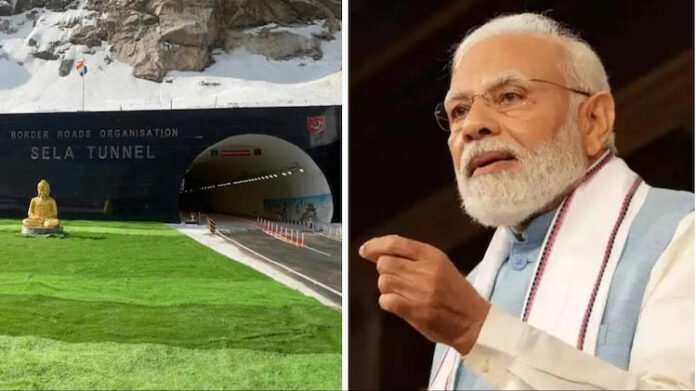Prime Minister Narendra Modi’s visit to Arunachal Pradesh for the inauguration of the strategic Sela Tunnel has sparked diplomatic tensions, with China lodging a protest against the visit. The inauguration of the tunnel, a crucial infrastructure project aimed at enhancing connectivity and security in the region, has reignited longstanding territorial disputes between India and China, underscoring the complexities of geopolitical dynamics in the Indo-Pacific region.
The Sela Tunnel, situated at an altitude of over 13,000 feet, holds strategic significance as it provides an all-weather road link to Tawang, a key town near the India-China border. The tunnel, constructed by the Border Roads Organisation (BRO), is expected to improve access to remote areas in Arunachal Pradesh and bolster India’s defense capabilities along the sensitive border with China.
However, China’s protest against Prime Minister Modi’s visit to Arunachal Pradesh underscores the broader geopolitical tensions between the two Asian giants, particularly regarding territorial claims in the region. China considers Arunachal Pradesh, which it refers to as “South Tibet,” as part of its territory, despite India’s sovereignty over the northeastern state being internationally recognized.
The inauguration of the Sela Tunnel by Prime Minister Modi serves as a symbolic assertion of India’s territorial integrity and strategic interests in the region, sending a clear message to China about its commitment to safeguarding its sovereignty and security along the border. However, it has also raised concerns about escalating tensions and potential destabilization in the Indo-Pacific region.
China’s protest against Prime Minister Modi’s visit to Arunachal Pradesh reflects its assertive stance on territorial disputes and its efforts to assert its influence in the region. Beijing has consistently opposed visits by Indian leaders to Arunachal Pradesh, viewing them as provocative acts that challenge its territorial claims and undermine bilateral relations between the two countries.
The diplomatic tensions surrounding Prime Minister Modi’s visit to Arunachal Pradesh underscore the complexities of India-China relations and the challenges of managing territorial disputes in the region. Despite efforts to maintain peace and stability along the border, the underlying tensions between the two countries continue to simmer, fueled by historical grievances, strategic interests, and geopolitical rivalries.
Moreover, China’s protest against Prime Minister Modi’s visit to Arunachal Pradesh reflects its broader geopolitical ambitions and its efforts to assert its influence in the Indo-Pacific region. Beijing’s assertiveness in territorial disputes, maritime claims, and regional affairs has raised concerns among neighboring countries and global powers about its intentions and motivations.
In response to China’s protest, India has reiterated its position on Arunachal Pradesh, asserting that it is an integral part of the country and that visits by Indian leaders to the region are entirely legitimate and non-negotiable. New Delhi has also underscored its commitment to resolving border disputes with China through peaceful dialogue and negotiations, emphasizing the importance of maintaining peace and stability along the border.
The inauguration of the Sela Tunnel by Prime Minister Modi represents a significant milestone in India’s infrastructure development efforts in the northeastern region, enhancing connectivity and security in border areas. However, it has also reignited territorial tensions with China, highlighting the complexities of managing geopolitical rivalries and territorial disputes in the Indo-Pacific region.
As India and China navigate the complexities of their bilateral relations, it is essential for both countries to exercise restraint, engage in constructive dialogue, and work towards finding mutually acceptable solutions to their differences. The inauguration of the Sela Tunnel should serve as an opportunity for India and China to reaffirm their commitment to peace and stability in the region, rather than exacerbating tensions and fueling further mistrust between the two countries.
In a nutshell, China’s protest against Prime Minister Modi’s visit to Arunachal Pradesh for the inauguration of the Sela Tunnel underscores the broader geopolitical tensions and territorial disputes between the two countries. As India and China seek to manage their differences and build constructive relations, it is imperative for both sides to prioritize dialogue, diplomacy, and peaceful resolution of disputes to ensure peace and stability in the Indo-Pacific region.



